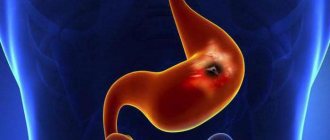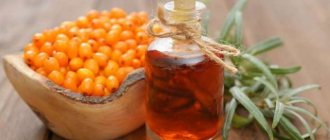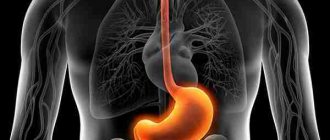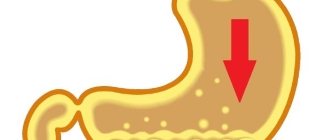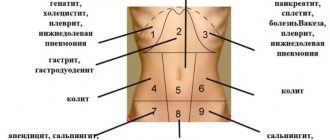Why does my stomach hurt with gastritis?
The occurrence of pain due to inflammation of the walls of the stomach, unfortunately, is far from uncommon.
Many symptoms may go unaddressed. The answer to this question lies in the very essence of the disease. The occurrence of pain due to inflammation of the walls of the stomach, unfortunately, is far from uncommon. Many symptoms may go unnoticed. Heartburn and nausea are sometimes not perceived as something serious, being attributed to temporary disorders: “I ate something wrong.” But pain becomes a good reason to consult a doctor and diagnose the condition of the digestive organs. The mucous membrane of the stomach does not have pain receptors, so any pain in this area is due to the sensitivity of the muscle fibers of the walls.
Gastritis is characterized by special sensations in the left side of the body, in the hypochondrium - where the stomach is located. In the acute course, cramping pain occurs, which can be either intense, moderate or weak. These sharp contractions, caused by spasm of the intestinal muscles (so-called cramps), occur several hours after eating. Distension pain occurs when the walls of the esophagus are stretched. This type of pain is not intense and can be described as a “feeling of heaviness.”
Feelings of pressure and fullness arise due to disturbances in the evacuation processes from the stomach. This condition is characteristic of chronic gastritis and occurs during or after eating. In addition, dull and aching pain may occur. In order to never learn in practice about the sensations accompanying gastritis, you should know what can cause them.
Painkillers
To eliminate spasms and pain in the stomach, painkillers are prescribed. Such drugs for gastritis of the stomach will relieve pain symptoms and improve well-being. To eliminate pain, No-Shpa, Atropine, Difacil, Papaverine, Mebeverine are used in treatment.
As a result of the use of these drugs, cellular activity stops, and the number of ions in the cells themselves decreases. Anticholinergic drugs (Atropine, Buscopan) effectively relieve pain. The main indication for their use is severe stomach cramps. All medications should be prescribed by a gastroenterologist depending on the characteristics of the disease. Self-medication can lead to disastrous consequences and is extremely dangerous.
De-nol for gastritis - read our article on how to take this drug.
Why does my stomach hurt?
Any pharmacy will offer you a wide selection of painkillers.
There are many causes of stomach pain and it is impossible to determine their origin from just one symptom, so an examination will be required. Stomach pain is a symptom of the following diseases:
- Gastritis acute and chronic
- Ulcer
- Gastric hypersecretion
- Ahilia
- Gastroesophageal reflux
- Neoplasms of various etiologies
- Food poisoning
Overeating and hunger are also accompanied by pain, but in this case drug therapy is not required. Hunger is characterized by nagging and cutting pain. Food poisoning, in addition to sharp pain, is accompanied by diarrhea and vomiting, and sometimes fever. In this case, painkillers alone are not enough.
Poor nutrition is the cause of pain and burning in the stomach. Heavy or fatty foods linger in the stomach, causing a feeling of heaviness, belching and heartburn.
Similar symptoms are observed in acute gastritis: severe pain, cramps, heartburn, diarrhea. The disease is accompanied by an inflammatory process. An anesthetic drug is prescribed depending on the acidity, increased or decreased. The ulcer reminds itself of itself with aching pain and belching. These symptoms include increased gas formation, nausea and pain after eating.
Antacids
Antacids - a class of drugs whose action is based on reducing irritation of the mucous membrane as a result of the movement of food and inflammatory processes occurring in the epithelium and nearby tissues of the stomach
Antacids - a class of drugs whose action is based on reducing irritation of the mucous membrane as a result of the movement of food and inflammatory processes occurring in the epithelium and nearby stomach tissues. These drugs act quite quickly and effectively, especially the latest generation tablets, suspensions or gels. The main active ingredients in them are aluminum, calcium, sodium and magnesium (aluminum-magnesium hydroxycarbonate, calcium-magnesium carbonate, sodium alginate).
These medications are characterized by an enveloping effect on the mucous membrane, which helps eliminate the negative effects of excess hydrochloric acid in gastritis with high acidity.
What antacid to drink for gastritis for pain and other unpleasant symptoms:
- Phosphalugel;
- Altacid;
- Rennie;
- Gastal;
- Gaviscon;
- Almagel;
- Gastracid;
- Maalox.
Types of pain
Chronic gastritis is accompanied by moderate stomach pain, which manifests itself during and after eating. Often it is short-lived, but after drinking alcohol and poor-quality food, the pain intensifies, accompanied by diarrhea and vomiting. This indicates intoxication of the body and damage to the mucous membrane, causing an exacerbation of the disease.
Unbearable pain accompanies the formation of an ulcer in the duodenum or stomach. Attacks occur mainly at night, when the stomach is empty. The chronic course of gastritis and the initial stage of ulcer formation are characterized by aching, dull pain. The same symptoms manifest themselves in the inflammatory process occurring in the duodenum.
Pain felt in the center of the abdomen indicates that the acidity in the stomach is reduced. Exacerbation of the disease can be caused by eggs and dairy products. Gradually increasing sharp pain indicates the presence of:
- pancreatitis;
- colitis;
- cholecystitis.
If the pain cannot be tolerated, it is possible that this is a rupture of the ulcer, requiring immediate hospitalization.
Antispasmodics
Antispasmodics refer to potent drugs that directly affect the source of pain.
Antispasmodics refer to potent drugs that directly affect the source of pain. The main active ingredient of antispasmodics is isoquinoline, which has a relaxing effect on the smooth muscle cells of the stomach walls, thereby preventing the occurrence of painful spasms.
Popular drugs in this group include:
- No-shpu;
- Drotaverine;
- Papaverine;
- Bendazole;
- Halidor;
- Mebeverine;
- Metacin.
The most famous remedy is No-shpa, and if the question arises of what to do, what to take and how to relieve pain with gastritis of the stomach, drink this particular remedy, since it will relieve pain very quickly and can be prescribed even to children from 3 years of age.
Cause of pain in gastritis
Gastritis pain is spasmodic in nature
The pain that occurs with this disease most often begins due to spasms of the smooth muscles of the stomach walls. Another reason may be excessive stretching of its walls. The mucous membrane of the stomach with gastritis is always inflamed, any mechanical impact on it (when food comes in) causes pain.
With gastritis with high acidity, excess acid irritates the gastric mucosa, a prolonged reflex contraction of the pylorus occurs, this spasm causes pain. The secretion of acid increases when food enters the stomach, and the nerve receptors of the mucous membrane suffer from this effect.
Only a gastroenterologist or therapist can assess the condition of a patient with gastritis and prescribe adequate treatment.
He will conduct a gastroscopy, prescribe laboratory tests, and advise painkillers for gastritis. Self-medicating without knowing the etiology of the disease is very dangerous. Information about medications used to relieve pain symptoms of gastritis is offered for informational purposes only.
Anticholinergics
Anticholinergics are a group of drugs that act directly on nerve receptors, blocking the sending of signals to the brain. Many anticholinergic blockers contain second-line substances that have an antispasmodic effect and reduce the secretion of hydrochloric acid by the gastric glands.
Because of this versatility, anticholinergics are also considered a very effective remedy for stomach pain due to gastritis.
The most well-known drugs in this group:
- Platifilin;
- Atropine;
- Gangleron;
- Palyufin;
- Gastrozem;
- Difacil;
- Histodil;
- Aprofen;
- Buscopan;
- Gastrocepin.
Folk remedies
Alternative medicine cannot become the main and only treatment for gastritis. Combining the use of herbal remedies and drug therapy can reduce discomfort and speed up recovery. Many plants have a wound-healing and soothing effect, so their use is simply necessary.
- Plantain juice for gastritis. It has amazing wound-healing properties. To prepare a healing drink, you only need a blender and fresh plantain leaves. The juice is drunk before meals, but no more than 70 g at a time.
- —Sea buckthorn for gastritis—. Everyone knows the healing properties of these berries. Drinking a tablespoon of juice three times a day will quickly get rid of the disease.
- Licorice root for gastritis. An infusion of this plant is drunk 125 g after each meal.
- Chamomile and rose hips for gastritis. They have a strong anti-inflammatory effect. The plants are brewed and consumed instead of tea.
Depressant drugs
The action of proton pump inhibitors is to reduce the level of hydrochloric acid production by the stomach at the intracellular (molecular) level.
If you do not know how to quickly relieve stomach pain with gastritis, then to reduce pain syndromes in the medium term you will need therapy using inhibitory drugs. They are prescribed for gastritis in a form with high acidity and include antisecretory drugs and proton form inhibitors.
The action of proton pump inhibitors is to reduce the level of hydrochloric acid production by the stomach at the intracellular (molecular) level. The main active ingredients of such drugs are benzimidazole derivatives. In addition to reducing secretory function, modern PPIs include substances to relieve reflux phenomena, as well as antibacterial components for the eradication of Helicobacter pylori.
So you can drink the following drugs from this group for gastritis, if your stomach hurts badly:
- Omeprazole;
- Lansoprazole;
- Pantoprazole;
- Dexlansoprazole;
- Rabeprazole;
- Esomeprazole;
- Omez.
Traditional recipes for relieving stomach pain
Traditional medicine methods eliminate discomfort, accelerate the effect of pharmaceutical drugs and reduce the likelihood of developing an allergic reaction.
The following home remedies are considered the most effective:
- Potato juice. Has an antacid effect and accelerates mucosal regeneration. There are several dosage regimens. Drink on an empty stomach once a day or three times, 30-40 minutes before meals. Start with 10 ml and gradually increase to a third of a glass.
- Flax-seed. Viscous and thick decoctions protect the surface of the digestive tract from the aggressive effects of hydrochloric acid and hot food, eliminate inflammation, and accelerate the healing of erosions. An additional effect is antibacterial. 1 tbsp. l. seeds, pour half a glass of boiling water and leave under the lid, shaking constantly. Take before meals. You can make healing jelly from flax. In this case, the crushed grains are infused in a thermos for at least 8 hours.
- Gooseberry. You need to cook a concentrated compote. Berries can be fresh, dry or frozen. If it is very sour, sweeten with honey. It must be strained before use.
- Chamomile. Brew infusion - 1 tbsp. l. for 1 glass of hot boiled water. Relieves inflammation and soothes. The effectiveness is enhanced if you brew yarrow together with chamomile.
- Dandelion syrup. The heads are collected during flowering, washed, poured into a colander, allowed to drain off excess liquid and covered with sugar in a ratio of 4:1. Stir vigorously or grind in a mixer and leave in the refrigerator for a week. Juice 1 tsp. diluted in 100 ml of water and taken 3 times a day.
If pain appears after eating, and there is no medicine at hand, brew tea from currant or peppermint leaves. Possible one-time use.
Antisecretory agents
Another category of drugs that reduce the production of hydrochloric acid are antisecretory agents. These are H2-histamine receptor blockers, the mechanism of action of which is to suppress the activity (block) of histamine receptors in the gastric mucosa, which reduces the secretion of hydrochloric acid and its concentration in the lumen of the stomach. Historically, H2 blockers were the first antisecretory drugs; currently their effectiveness is somewhat lower than that of PPIs, but they are also milder.
The most well-known drugs in this group:
- Tagamet;
- Zantac;
- Histodil;
- Famotidine;
- Ranisan;
- Kvamatel;
- Ranitidine;
- Ulfamid.
Proton pump blockers
This group of medications refers to medications for stomach pain caused by excessive production of hydrochloric acid. Chronic gastritis, pancreatitis, esophagitis, and ulcers are treated with proton pump inhibitors. The choice of a specific drug depends on the type of disease and the severity of symptoms. Proton pump brokers include the following drugs:
- Lanzap;
- Losek;
- Nolpaza;
- Nexium.
These agents block the synthesis of hydrochloric acid at the final stage. The effect of drugs from this group begins 40–60 minutes after administration.
How to relieve pain due to high acidity
For high acidity and gastritis, drugs belonging to the group of antacids are widely used. These medicines have the following effects:
- Neutralize hydrochloric acid. It is secreted by the cells of the stomach, thereby increasing the acidity of its contents, causing pain and heartburn.
- Decreased peptic activity.
- Enveloping effect. Achieved due to the ability of antacid drugs to bind bile acids.
- Cytoprotective effect. Some drugs can enhance mucus formation and prostaglandin synthesis.
- Tissue regeneration. Antacid drugs can activate the growth of epithelial cells at the site of damage to the gastric mucosa, accelerating the healing of ulcers.
- They have an analgesic effect.
For high acidity and gastritis, drugs belonging to the group of antacids are widely used.
There are 2 main types of antacid drugs used for gastritis :
- Absorbable drugs. They quickly and faster than others have a healing effect, but their effect is short-lived. Side effects include belching and increased blood pressure. This changes the acid-base balance in the stomach. This group includes:
- Bourget mixture;
- magnesium oxide;
- sodium bicarbonate;
- calcium carbonate;
- Rennie's mixture;
- mixture of Tams et al.
- Non-absorbable drugs. This group of drugs has a longer neutralizing effect. They do not change the acid-base balance. This group includes:
- magnesium hydroxide;
- Maalox;
- aluminum hydroxide;
- Almagel neo;
- Topalcan et al.
How to get rid of pain
In order to relieve pain due to gastritis, drugs of various pharmacological groups are used:
- Antispasmodics. These medications relieve spasms by slowing down cellular activity.
- Anticholinergics. The drugs act on nerve endings, relieving a painful attack of gastritis during exacerbation of the disease.
- Antacids. Medicines have an enveloping effect, thereby protecting the mucous membrane from the effects of hydrochloric acid. They additionally relieve unpleasant symptoms such as belching and heartburn.
Advice! Any pain reliever for gastritis should be prescribed by a doctor. In this case, be sure to follow the dosage and take into account contraindications.
Traditional medicine is widely used for pain relief for gastritis. They relieve pain more slowly and require taking for a long time.
How to relieve pain with low acidity
For gastritis with low acidity, nicotinic acid helps normalize the stomach environment.
Thanks to its action, there is an increase in the release of hydrochloric acid into the gastric juice. With gastritis with low acidity, nicotinic acid helps to normalize the stomach environment. Thanks to its action, there is an increase in the release of hydrochloric acid into gastric juice.
To relieve pain, the following medications can be used: :
- Antispasmodics. They reduce the tone of the smooth muscles of the digestive organs, reducing pain. The most commonly prescribed drugs are:
- Papaverine hydrochloride;
- No-shpa;
- Baralgin.
- Analgesics. These painkillers, due to their analgesic effect, reliably relieve pain. There are narcotic and non-narcotic analgesics. They are prescribed only by a doctor. Narcotic analgesics include:
- Morphine;
- Omnopon;
- Promedol, etc.
Non-narcotic analgesics include :
Painkillers
Almagel A is also used, which contains aluminum hydroxide, which can neutralize hydrochloric acid in gastric juice.
For gastritis, the following painkillers and tablets are used :
- Antacids and enveloping drugs are used for pain relief and healing. This method is suitable for patients with high acidity. Calcium carbonate is used at the rate of 1 gram of the drug per dose. Almagel A is also used, which contains aluminum hydroxide, which can neutralize hydrochloric acid in gastric juice. For severe pain, Atropine, Platifilin and Metacin are prescribed. These drugs are classified as peripheral anticholinergics.
- Antispasmodics. Appropriate as painkillers for gastritis with reduced secretion. Drugs such as Baralgin and No-shpa in tablets or intramuscularly are widely used. The dosage is determined depending on the patient's medical history.
- In the most severe cases, the use of narcotic analgesics is permissible. Their use should be carried out only in a hospital and under the supervision of a doctor. Promedol and Morphine effectively relieve pain. Non-narcotic analgesics are rarely used and only as prescribed by a doctor, as they have a detrimental effect on the mucous membranes of the digestive organs.
Traditional medicine (teas, infusions)
There are a large number of folk remedies that can alleviate gastritis.
In cases where acidification is delayed, apply:
- Plantain juice has a good effect. To prepare it, you need to grind the fresh leaves of the plant and pass it through a meat grinder or juicer. A blender will also work. The juice is taken before meals, one tablespoon at a time.
- Cabbage juice is also used for low acidity. Prepare it in the same way and take 3 tablespoons before meals.
- Lettuce juice.
- Laminal. This is a biologically active food supplement that accelerates healing and normalizes the acid-base balance of the stomach.
- Licorice root infusion. Dry roots are ground (2 tablespoons) and poured with a glass of boiling water. After infusing licorice for several hours, you can take 1/4 cup immediately after meals.
Plantain juice has a good effect.
To prepare it, you need to grind fresh leaves of the plant and pass through a meat grinder or juicer. For high acidity, use :
- Potato juice. It is obtained by pressing and is drunk only fresh. You need to drink half a glass of juice 30 minutes before meals for one and a half weeks.
- Sea buckthorn oil. It has a healing and anti-inflammatory effect. It should be taken a teaspoon 2-3 times a day for a month.
- A decoction of flax seeds. To prepare it you need 2 tablespoons of seeds. They need to be poured with a glass of boiling water and left for 10 hours. The prepared decoction is taken during the day before meals.
- Decoction of rose hips. The fruits must be boiled for 5-7 minutes and the broth allowed to cool and brew. The drink is taken one glass three times a day before meals.
- A decoction of chamomile flowers. The flowers must be poured with boiling water and left overnight.
Take 1/2 cup of decoction before each meal.
Many traditional medicines have a positive and long-lasting effect. But to avoid unpleasant consequences, it is better to consult a specialist before using each of them.
Antispasmodics for gastritis
The most famous and frequently used antispasmodic is the drug No-shpa and its cheaper analogue - Drotaverine. Its analgesic effect is carried out due to a component such as Isoquinoline, which acts on the smooth muscle cells of muscle tissue, relaxing them and relieving pain spasms. Drotaverine and Nosh-pu can be taken starting from childhood:
- 3-6 years – 20 mg (half a tablet) 2-3 times a day, no more than 120 mg per day.
- 6-12 years – 40 mg (1 tablet) 2-5 times a day, no more than 200 mg per day.
- 12 years and older – (2 tablets) 3-4 times a day, no more than 400 mg per day.
Contraindications to the use of No-shpa and Drotaverine may be:
- Heart failure
- Severe renal failure
- Liver failure
- Individual intolerance
- Early childhood (up to 1 year)
Antispasmodics are good for pain relief
It is not recommended to take the drug during breastfeeding, during the entire period of pregnancy, with Parkinson's disease, or lactose intolerance. The peculiarity of this drug is that it does not have a negative effect when driving vehicles, machines and mechanisms.
Papaverine has an analgesic effect similar to No-shpe, since it is close to this drug in structure and mechanism of action, but its effectiveness on smooth muscles is several times lower.
Bendazole is a drug used to relieve spasms of the abdominal organs, bronchi, and blood vessels. It is used in the form of intravenous and intramuscular injections (20-30 mg 2-3 times a day), the course of treatment takes 1-2 weeks. Drugs from the group of antispasmodics such as Mebeverine, Halidor, Metacin have a similar effect on the cause of pain.
Restrictions on taking painkillers
If you experience stomach pain, it is important to understand what caused it, determine its nature, and whether it radiates.
The doctor should always decide how to relieve pain in the stomach. You should not self-medicate, especially if, in addition to pain, the following symptoms are observed:
- nausea and vomiting, especially if there is an admixture of blood in the vomit;
- severe intoxication;
- food poisoning;
- severe dehydration of the body, which is manifested by dry skin, decreased elasticity, and severe thirst;
- disorders of consciousness and drop in blood pressure;
- tension in the anterior abdominal wall;
- development of neurological signs (seizures).
If these symptoms appear, you should immediately seek medical help.
Despite the fact that there are a number of drugs available without a doctor’s prescription that can relieve stomach pain, it is still undesirable to take them on your own, since only a doctor can select an adequate treatment regimen. Also, any medicine has its own contraindications and side effects. In addition, stomach pain can be a symptom of a dangerous disease and only a doctor can identify it. Therefore, when it appears, you should go to the hospital as soon as possible.
List of first aid medications
There are medications with a wide spectrum of action that are taken for any pain in the stomach. These include:
- enzymes to improve digestion - Pancreatin, Creon, Mezim;
- antispasmodics – No-Shpa, Drotaverine, Trimedat, Papaverine;
- enveloping agents – Almagel, Phosphalugel;
- absorbents – Smecta, Novosmectin.
It is advisable to have one of the medications from each group in your home medicine cabinet. If a person knows what causes stomach discomfort, choosing a medicine to relieve symptoms is much easier.
Stomach pain is one of the signs of exacerbation of gastritis and other pathologies of the digestive tract. The disease can be cured without becoming chronic if you undergo a course of treatment prescribed by a specialist.
Treatment of gastritis: general recommendations
Despite the fact that there are a number of drugs available without a doctor’s prescription that can relieve stomach pain, it is still undesirable to take them on your own, since only a doctor can select an adequate treatment regimen.
Most people suffering from this pathology know how to relieve stomach pain due to gastritis: I took a pill, and after a certain time the unpleasant symptoms went away. But inflammatory processes in the mucous membrane cannot be stopped with one pill, and in general, drug therapy alone is completely insufficient for this. Even the most effective drugs of the latest generation will not help if the patient continues to consume foods that irritate the stomach. Therefore, a strict diet is an indispensable component in the treatment of all forms of gastritis and most other gastrointestinal problems.
The dietary menu includes products that help reduce/increase the production of hydrochloric acid (depending on the form of gastritis) and reduce the irritating effect of food on the walls of the stomach.
Many of the patients, knowing how to reduce gastritis pain with the help of tablets, prefer to use time-tested folk remedies. Thus, a good effect can be achieved by using the juice of plantain, a plant that has a healing effect. In addition to eliminating inflammation, this remedy relieves spasms of the stomach walls and eliminates pain. Sea buckthorn juice has the same effect, which should be consumed about an hour before meals.
Important: smoking and alcohol are factors that constantly provoke irritation of the mucous membrane. It is known that among smokers and people who abuse alcohol, gastritis occurs twice as often, and this category of the population has a very high risk of developing peptic ulcers and stomach cancer.
The medications discussed in this article are sold over-the-counter, but this does not mean that self-medication is safe. Even if you know well what to do and how to relieve acute pain from gastritis of the stomach, you should not abuse painkillers - use them only as prescribed by your doctor and only in recommended dosages.
Sources:
https://www.kp.ru/guide/boli-pri-gastrite.htmlhttps://izlechisebya.ru/mozhno-li-pri-gastrite/mozhno-li-pri-gastrite-pit-obezbolivajushhie.htmlhttps:// pobedigastrit.ru/lekarstva/kak-snyat-bol-pri-gastrite.htmlhttps://gastritinform.ru/private-catering.ru/obezbolivajushhie-tabletki-pri-gastrite/
Groups of painkillers for the stomach
Nonsteroidal anti-inflammatory drugs based on acetylsalicylic acid, ibuprofen and diclofenac are prohibited for abdominal pain. Their uncontrolled use can lead to gastritis, duodenal or stomach ulcers. The following are allowed for stomach pain:
- Antacids. These drugs not only relieve abdominal pain, but also treat the cause of its occurrence. They are alkaline, so they interact with the acidic environment of the stomach.
- Antispasmodics. This is the most common group of painkillers for the stomach, the action of which is aimed at relieving spasms of smooth muscles.
- Proton pump blockers. They act at the cellular level, block the synthesis of hydrochloric acid by parietal cells, protecting them from an acidic environment.
- Histamine receptor blockers. These drugs stabilize the production of prostaglandins, gastric mucus, pepsin and bicarbonates.
- Bismuth-containing preparations. Their main purpose is to treat ulcers. This group of drugs exhibits bactericidal activity against Helicobacter pylori.
Antacids
The effect of antacid drugs is to neutralize the acidity of gastric juice and coat the mucous membrane. This helps relieve pain, eliminate heartburn and activate recovery processes. Modern antacid medications contain aluminum and magnesium salts, which increase the effectiveness of these medications. Their main advantage is the minimum of contraindications:
- renal failure;
- individual intolerance to individual components.
The last contraindication concerns magnesium oxide, calcium carbonate, aluminum hydroxide, sodium bicarbonate. These substances are classic active components of antacids. Preparations based on them are used to treat:
- gastritis with high acidity;
- reflux disease, in which stomach contents flow back into the esophagus.
Another advantage of antacids is their local effect. These drugs are not absorbed into the systemic circulation, which is why they have virtually no side effects. Some antacids are capable of adsorbing toxins, so such tablets for stomach pain are also used in cases of food poisoning. Effective drugs in this category are:
- Phosphalugel;
- Rennie;
- Gaviscon;
- Almagel;
- Rutacid;
- Maalox;
- Enterosgel.
Antispasmodics
These are painkillers for gastritis and stomach ulcers. Additionally, antispasmodics help eliminate unpleasant symptoms of gastroesophageal reflux. The main effect of such drugs is to regulate the contractile function of muscles, which helps eliminate their involuntary spasms. This effect is achieved in different ways depending on the type of antispasmodics used:
- Neurotropic. They act on nerve impulses and stimulate muscle function. Suppression of spasm is due to blocking the pain signal. Neurotropic antispasmodics are M-anticholinergics: Methocinium, Hyoscyamine, atropine sulfate, Buscopan.
- Myotropic. They influence biochemical reactions inside muscle cells, which also provides relief from spasms. Papaverine, Spasmomen, Trimedat, Papazol, Drotaverine, No-shpa have this effect.
Antispasmodics for the stomach include both pharmacological tablets and herbal remedies. The latter contain extracts of medicinal herbs: chamomile, oregano, tansy, lily of the valley, mint, belladonna. Both groups of drugs have minimal contraindications:
- enlarged colon;
- certain types of colitis;
- microbial intestinal diseases;
- tuberculosis;
- Crohn's disease.
Proton pump blockers
Proton pump inhibitors or blockers help relieve heartburn. This effect is due to blocking the secretory function of the parietal cells of the stomach, which produce hydrochloric acid. After taking proton pump inhibitors, the processes of regeneration of the digestive system function are started. Additionally, these drugs protect the mucous membrane from high acidity. They are used as pain relievers for stomach ulcers, gastritis, and esophageal reflux. Popular among proton pump blockers are:
- Omeprozole;
- Nolpaza;
- Pantoprazole;
- Lansoprazole.
When treating chronic ulcers, they are more effective in combination with antibiotics. After taking proton pump inhibitors, disorders of the visual analyzer are possible, which is often manifested by a decrease in visual acuity. Possible muscle pain, depression, changes in the leukocyte formula. Proton pump blockers have a minimum of contraindications:
- pregnancy;
- lactation;
- malignant tumors of the digestive tract;
- liver and kidney failure;
- gastrointestinal infections.
Histamine receptor blockers
Another name for these drugs is H2-histamine receptor antagonists. They reduce acidity levels, which helps eliminate pain. The action is due to blocking receptors on the surface of cells in the gastric mucosa. Additionally, histamine receptor blockers increase the production of prostaglandins and mucus, which has a beneficial effect on digestion. This group of painkillers for the stomach includes:
- Ranitidine (Zantac, Ranisan, Gistac);
- Nizatidine (Axid);
- Roxatidine (Roxane);
- Famotidine (Famosan, Kvamatel);
- Cimetidine (Cinamet).
Most of these medications must be taken 2 times a day - morning and evening. Histamine receptor blockers are tablets for pain in the stomach and pancreas. The disadvantage of these medications is that they do not effectively suppress the production of gastric juice, which is why the pain syndrome may return. In addition, histamine receptor blockers cause fatigue, vertigo and headache. The list of contraindications to these drugs includes:
- age up to 14 years;
- lactation;
- pregnancy;
- cirrhosis of the liver;
- disorders of the liver and kidneys;
- hypersensitivity to the composition of the drug.
Bismuth-containing preparations
The peculiarity of bismuth-containing painkillers for the stomach is the presence of a bactericidal effect against Helicobacter. These microorganisms cause inflammation of the mucous membrane, which can lead to ulceration. In addition to analgesic, bismuth-containing drugs have an anti-inflammatory effect. Examples of such drugs are:
- De-nol;
- Vikalin;
- Vikair;
- Vis-nol.
- Sausages in batter - recipes with photos. How to cook fried sausages in batter in a frying pan or on a stick
- Mucus discharge in women
- Vegetable soup: recipes with photos
Bismuth preparations affect the pathogen at the cellular level: they prevent the colonization of Helicobacter and reduce the symptoms of gastritis and ulcers. Such medications for stomach pain have an astringent effect, i.e. envelop the mucous membrane with a protective film. This blocks pain and prevents the occurrence of erosions and ulcers. Contraindications to the use of bismuth-based products are:
- allergy to the composition of medications;
- lactation;
- pregnancy;
- renal failure.

